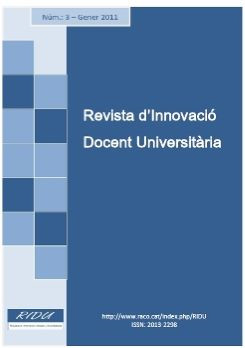Éxito académico, características personales y proceso de Bolonia: una aplicación econométrica
DOI:
https://doi.org/10.1344/105.000001655Palabras clave:
Educación Universitaria, Espacio Europeo de Enseñanza Superior, Éxito educativo, Experimento natural, Logit ordenadoResumen
La universidad española se encuentra en pleno proceso de implementación del espacio europeo de la enseñanza superior (EEES), aspecto que modificará las metodologías docentes que habitualmente se han venido utilizando. Este trabajo tiene como objetivo principal examinar en qué medida las nuevas metodologías docentes pueden influir en las calificaciones obtenidas por los alumnos. Para ello se ha elaborado una encuesta entre los alumnos de la asignatura de Política Económica I de la Universitat de Barcelona, donde podemos distinguir dos grupos de estudiantes: los que han seguido la metodología docente del EEES por un lado, y los que han mantenido la metodología tradicional de evaluación. Este hecho conforma una estructura de experimento natural, en el que existe un grupo afectado por el cambio en la metodología docente, y un grupo de control que no se ve afectado por el cambio. La estimación de un modelo logit ordenado nos permite observar como las nuevas metodologías docentes basadas en la implementación del EEES ayudan a mejorar substancialmente las calificaciones obtenidas por los alumnos. Otras variables que ayudan a obtener mejores calificaciones son las horas de estudio, la asistencia a clase así como los conocimientos previos de los alumnos. En este sentido, una implantación exitosa del EEES exigirá desarrollar las estrategias de motivación pertinentes para que aumente las horas que los alumnos dedican al estudio, aumente el porcentaje de asistencia a las clases magistrales y haya una coordinación adecuada de los diferentes programas de las asignaturas. En definitiva, la implementación del EEES puede ser un buen instrumento para mejorar el rendimiento académico de los estudiantes universitarios españoles siempre que la reforma tenga en cuenta aquellos aspectos que influyen en dicho rendimiento. Esto debe tenerse en cuenta a la hora de valorar una reforma tan compleja que será exigente tanto para alumnos como para profesoresCitas
Anderson, G.; Benjamin, D.; Fuss, M.A. (1994) The determinants of success in university introductory economies courses. Journal of Economic Education, 25(2), pp. 99-119.
Cuxart, A. (2000) Modelos estadísticos y evaluación: tres estudios en educación. Revista de Educación, 323, pp. 369-394.
De Landazábal, Mª.C.; Bilbao, F.; Otero, J.; Caballero, C. (2002) Formación inicial y rendimiento en física del primer curso universitario. Revista de Educación, 329, pp. 331-347.
Florido, C.; Jiménez, J.L.; Santana, I. Piedras en el camino hacia Bolonia: efectos de la implantación del EEES sobre los resultados académicos. Revista de Educación, en prensa.
García, Mª.; San Segundo, Mª.J. (2001) El rendimiento académico en el primer curso universitario. Presentado en las X Jornadas AEDE, Universidad de Murcia.
Gil, J. (2005) Aplicación del método Bootstrap al contraste de hipótesis en la investigación educativa. Revista de Educación, 336, pp. 251-265.
González, Mª.C.; Castellanos, L.; González De Sela, Mª.A.; Manzano, I.Mª. (1999) Influencia del currículo previo sobre el rendimiento en matemáticas empresariales: un estudio para la Universidad de Oviedo. Revista de Educación, 319, pp. 223-238.
Marcenario, O.; Navarro, Mª.L. (2001) Un análisis microeconómico de la demanda de educación superior en España. Estudios de Economía Aplicada, 19, pp. 69-86.
Marcenario, O.; Navarro, Mª.L. (2007) El éxito en la universidad: Una aproximación cuantílica. Revista de Economía Aplicada, 44(15), pp. 5-39.
Marzo, M.; Esteban, L.; Gargallo, A. (2006) ¿Inciden las nuevas tecnologías en los resultados alcanzados por los alumnos?: Un estudio exploratorio. Revista de Educación, 340, pp. 695-711.
Olmedo, A. (2007) Reescribiendo las teorías de reproducción social: influencia de la clase social en las trayectorias educativa y laboral del alumnado granadino de Secundaria y Bachillerato. Revista de Educación, 343, pp. 477-501.
Rojas, E. (2003) Importancia de la familia en la educación de los hijos: una evaluación cuantitativa en seis países de América Latina. Revista de Educación, 331, pp. 453-488.
Tejedor, F.J.; García-Valcárcel, A. (2007) Causas del bajo rendimiento del estudiante universitario (en opinión de los profesores y alumnos). Propuestas de mejora en el marco del EEES. Revista de Educación, 342, pp. 443-473.
Torío, S.; Hernández, J.; Peña, J.V. (2007) Capital social familiar y expectativas académico-formativas y laborales en el alumnado de educación secundaria obligatoria. Revista de Educación, 343, pp. 559-586.
Vila, J. (2008) Lengua familiar y conocimiento de la lengua escolar en Cataluña al finalizar la Educación Infantil. Revista de Educación, 346, pp. 401-424.
Descargas
Publicado
Número
Sección
Licencia
Derechos de autor 2011 Daniel Albalate, Xavier Fageda, Jordi Perdiguero

Esta obra está bajo una licencia internacional Creative Commons Atribución 4.0.
Los autores que publiquen en la revista RIDU, aceptan las condiciones siguientes:
- El autor/a conserva los derechos de autoría y otorga a la revista el derecho a la primera publicación de la obra.
- Los textos se publicarán bajo la licencia Reconocimiento 4.0 España de Creative Commons, la cual permite compartir, distribuir, reproducir y la comunicación pública, siempre que se reconozca la autoría i la revista.







